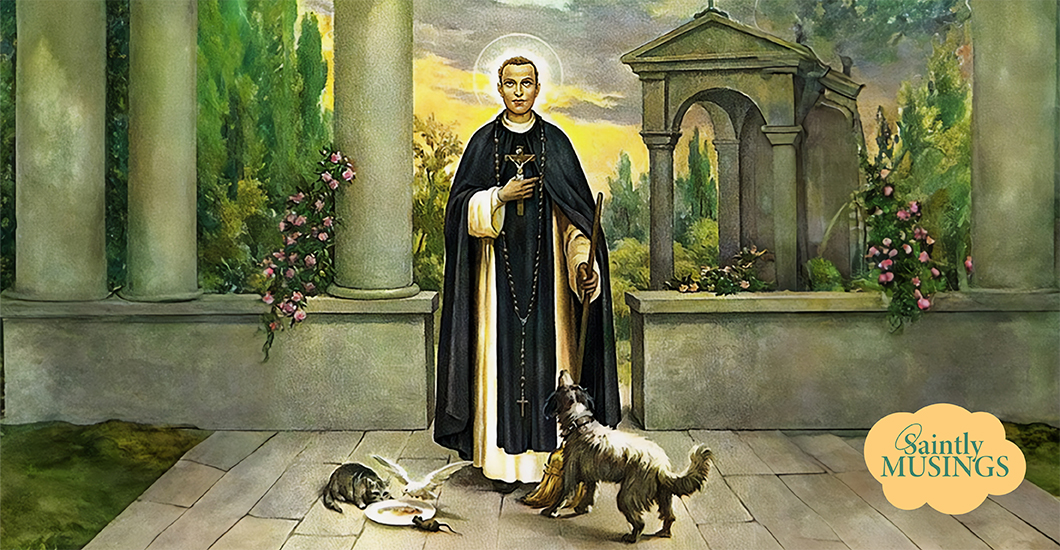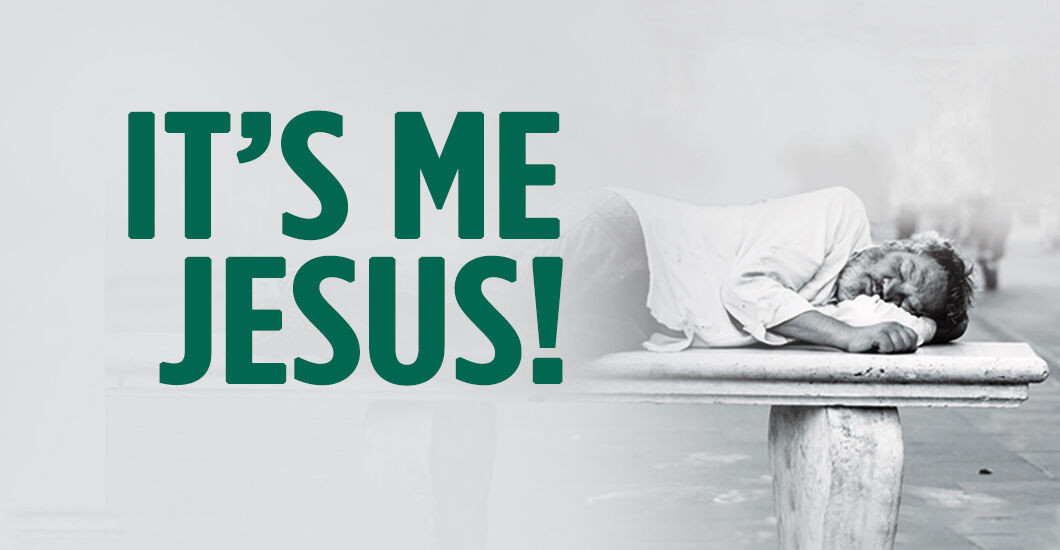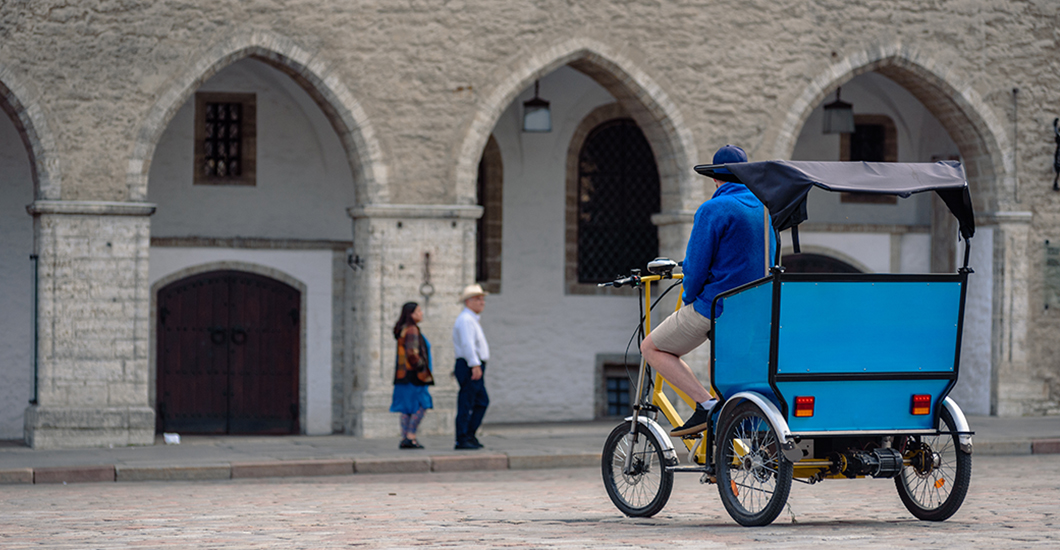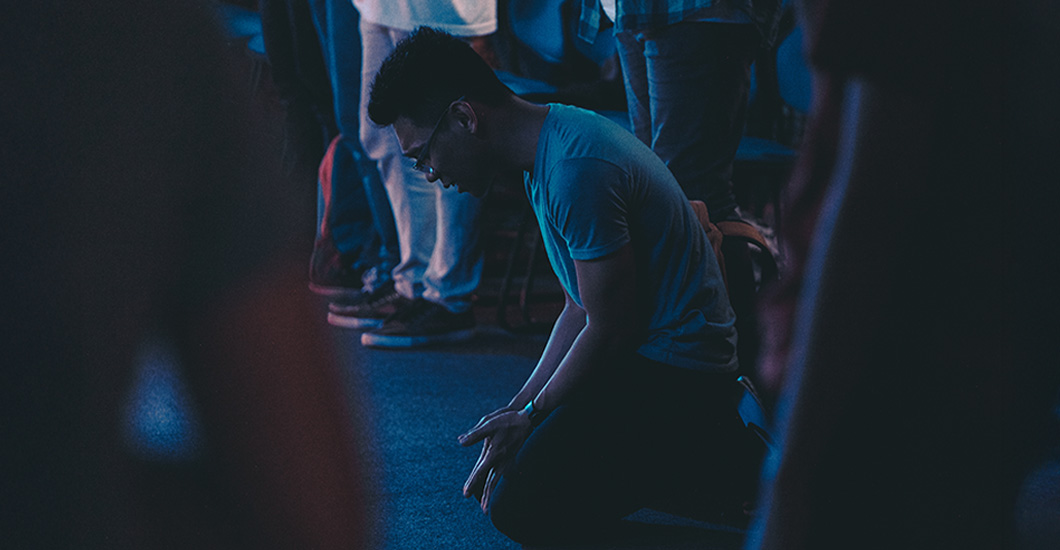Trending Articles
Make Me Smile Lord
When I become too serious
Make me smile Lord
When I become too anxious…
Make me smile Lord
When I become too envious…
Make me smile Lord
When the journey is long and boring…
Make me smile Lord
When people are cold and uncaring…
Make me smile Lord
When I’m tired and my strength is failing…
Make me smile Lord
When I’m burdened with work and deadlines…
Make me smile Lord
When I’m stressed with money and finances…
Make me smile Lord
When I have to adjust to unforeseen changes…
Make me smile Lord
When I feel like shouting and complaining…
Make me smile Lord
When people around me become irritating…
Make me smile Lord
When I experience
loneliness and
pain…
Make me smile
Lord
When I don’t feel
well…
Make me smile
Lord
When I don’t know and
I don’t care…
Make me smile Lord
And when I don’t feel like
smiling…
Make me smile Lord
Father Jerry Orbos SVD
Related Articles
Something made me stand still that day…and everything changed. I was about to start my rosary group at the nursing home where I work as a pastoral care practitioner when I noticed 93-year-old Norman sitting in the chapel alone, looking forlorn. His Parkinson's tremors seemed quite pronounced. I joined him and asked how he was doing. With a defeated shrug of his shoulders, he muttered something in Italian and became quite tearful. I knew that he was not in a good place. The body language was very familiar to me. I had seen it in my dad a few months before he died—the frustration, sadness, loneliness, angst of ‘why do I have to continue living like this,’ physical pain evident from the furrowed head and glassy eyes… I became emotional and could not speak for a few moments. In silence, I put my hand on his shoulders, assuring him that I was there with him. A Whole New World It was morning tea time. I knew that by the time he manages to shuffle to the dining room, he would miss the tea service. So, I offered to make him a cuppa. In my minimal Italian, I was able to discern his preferences. At the nearby staff kitchen, I made him a cup of tea, with milk and sugar. I cautioned him that it was quite hot. He smiled, indicating that’s how he liked it. I stirred the drink many times as I did not want him to get scalded, and when we both felt it was the right temperature, I offered it to him. Because of his Parkinson’s, he could not hold the cup steady. I assured him that I would hold the cup; with mine and his trembling hand, he sipped the tea, smiling so delightfully as if it was the best drink he ever had in his lifetime. He finished every single drop! His shaking soon stopped, and he sat up, more alert. With his distinguished smile, he exclaimed: “Gracias!” He even joined the other residents who soon ambled to the chapel, and he stayed on for the Rosary. It was only a cup of tea, yet it meant the whole world to him—not only to quench a physical thirst but also an emotional hunger! Reminiscent While helping him drink his cuppa, I remembered my dad. The times he enjoyed the meals we had together without rushing, sitting with him at his favorite spot on the sofa as he struggled with his cancer pains, joining him in his bed listening to his favorite music, watching healing Masses together online… What drew me to meet Norman at his need that morning? Surely it was not my weak and carnal nature. My plan was to set up the chapel quickly as I was running late. I had a task to accomplish. What made me stand still? It was Jesus, who enthroned His grace and mercy in my heart to respond to the needs of someone. At that moment, I realized the profoundness of Saint Paul’s teaching: “It is no longer I who live, but it is Christ who lives in me.” (Galatians 2:20) I wonder when I reach Norman’s age and I long for a cappuccino, ‘with almond milk, half strength, extra hot,’ will someone make one for me with such mercy and grace too?
By: Dina Mananquil Delfino
MoreWhatever the situation you are going through, God will make a way where there seems to be no way… Today, my son Aaric brought home his dictation book. He got a red star with a ‘good’ remark. This might not be a big deal for a kindergartener, but for us, it is a celebrated achievement. The first week of school, I got a call from his class teacher. We dreaded this call, my husband and I. As I tried hard to explain his communication skills (or lack thereof) to his teacher, I remember confessing that while I cared for his big sister with special needs, I had fallen into this pattern of doing things without being asked. As she could not utter a single word, I had to guess her needs. The same mode was turned on for Aaric, too, in his early days. Even before he asked for water, I would give it to him. We had a bond that didn’t need words, a language of love, or so I thought. How miserably wrong I was! Not much later, when his little brother Abram turned three months old, I had to take those heavy steps again to see the counselor at school. This time, it was about Aaric’s poor writing skills. His dear class teacher panicked when she saw him drop his pencil on the table and stubbornly fold his hands as if to say: “I won’t write.” We dreaded this, too. His little sister Aksha was an expert at scribbling at the age of two, but Aaric wouldn’t even hold the pencil. He just didn’t fancy it. The First Step After receiving instructions from the counselor, I visited the principal, who insisted that we undergo a thorough assessment if his communication continues to be weak. I couldn’t even think of that back then. For us, he was a miracle baby. After what we went through with our firstborn and three miscarriages, Aaric had defied all odds. He was born full-term, unlike what the doctors had predicted. His vitals were normal at birth. “He’s a big baby!” exclaimed the doctor on bringing him out through a C-section. We watched him grow step by step with almost bated breath, praying nothing would go wrong. Aaric soon reached all his milestones. However, when he was just one year old, my father mentioned that he may need speech therapy. I brushed it off as being too early to diagnose. The truth was, I didn’t have the strength to face another problem. We were already worn out with all that our firstborn was going through. Anna was born preterm at 27 weeks. After many grueling days in the NICU, she was diagnosed with severe brain damage at three months and had epileptic seizures. After all the treatments and medications, our now 9-year-old daughter still battles with cerebral palsy and intellectual disability. She is unable to sit up, walk, or talk. Countless Blessings There’s a limit to holding off the inevitable, so six months ago, we reluctantly took Aaric to get an initial assessment. The ADHD diagnosis was hard. We struggled to accept it, but we still put him through speech therapy. At this point, he was only stuttering a few words. A few days back, I mustered the courage to go to the hospital with Aaric and get a full, thorough assessment. Mild autism was what they said. As we were going through the process of assessment, several questions were asked. To my surprise, my response to most of these questions was: “He wasn’t able to, but now he can.” Praise God! By the power of the Holy Spirit living in him, everything is possible. I believe that praying and blessing him every day before going to school has made a difference. The change was radical when he began to memorize Bible verses. And the beauty is that he recites those verses just when I need them. Indeed, the Word of God is living and active. I believe the transformation is ongoing. Whenever I feel low, God surprises me by making him say a new word. Amid the tantrums he puts up, and when everything seems to crumble down, my little girl, three-year-old Aksha, simply comes up and gives me a hug and a kiss. She really knows how to comfort her mama. I believe that God will surely intervene and heal our eldest daughter, Anna, too, for nothing is impossible for Him. Change is already visible—the number of times she goes into epileptic seizures has gone down tremendously. In our walk of life, things may not be going as expected, but God never leaves nor forsakes us. Just like oxygen that is essential yet invisible, God is ever present and provides the life we need so badly. Let us cling to Him and not doubt whilst in the darkness. May our testimony reveal the truth of how beautiful, wonderful, and loving our God is and how He transforms us to say: “I was …, but now I am ….”
By: Reshma Thomas
MoreMartin de Porres was born in 16th-century Peru; he grew up facing the stigmas of both his mixed race and illegitimacy. After a barber-medical apprenticeship in his young years, he joined the Dominicans as a ‘lay helper’ and continued his barber work in the monastery. One day, Brother Francis Velasco Carabantes approached Martin, desiring to talk to this man whom people were already starting to believe was saintly. Martin was busy with his barber work; he absent-mindedly grabbed this novice and placed him in the barber’s chair. Brother Francis had no inclination to have his head shaved; he disliked the hairstyle that the Dominicans used. Before he could resist, Martin had finished his job, and Brother Francis was angry beyond expression. He started to shout, calling Martin all sorts of curse words. Martin was lost in prayer, and by the time he noticed that this novice was shouting, one of the rectors had seen the commotion and was scolding Brother Francis, who was severely punished and sent away. Martin, once he came to realize what had happened, went to the rector with all possible excuses. He begged forgiveness for this person who had verbally abused him, trying even to explain away the curse words used. Finally, he told the rector: “Everyone knows what a sinner I am.” The rector, who was aware of Martin’s saintly life, gave in to his request and forgave Brother Francis. Not satisfied with this, Brother Martin even sent fresh fruit, which was a rare delicacy in the monastery, to Brother Francis. How many times have we rejoiced in the ‘just’ punishments that our transgressors received? Let us pray to Saint Martin for the virtue of humility, to forgive and show the other cheek, as Jesus taught us to do.
By: Shalom Tidings
MoreHow often do we muse over not getting enough time to do the things we like? This New Year, let’s make a difference. I have never really been one to make New Year’s resolutions. I am reminded of this as I look at the stack of unread books gathering dust on my desk, purchased in the previous years in an ambitious yet miserably failed attempt. A book a month turned into a stack of unread intentions. I had a million reasons as to why I wasn’t successful in my resolution, but lack of time wasn’t one of them. Looking back now on the years lost with a slight disappointment in myself, I realize I really could have made better use of my time. How often in my life have I complained about not having enough time to do the things I’d like? Certainly more than I can count! A few years ago, sitting next to my husband in the hospital on New Year’s Eve as he received his routine treatment, something tugged at my heart. Observing him uncomfortably connected to his intravenous infusion, I noticed that his eyes were closed and his hands were folded in prayer. Apparently feeling my quizzical stare, he slightly opened one eye and, while peeking at me, quietly whispered: “Everyone.” Somehow, he read my mind. We often pray for those around us whom we perceive as hurting or in need of prayers, but today, we were sitting alone, and I was puzzled as to who he may have been praying for. It was moving and inspiring to think that he was praying for “everyone” and not just those who we assume could use prayers because of their outward appearances. Everyone—every one of us needs prayers. We are all in need of God’s grace and mercy regardless of the image we project to the world. This seems true, especially now when so many people are silently suffering from loneliness, financial trouble, and even mental health struggles that are often hidden away. No one truly knows what another person is going through, has gone through, or will go through. How powerful would it be if we all prayed for each other? How life-changing, world-changing, it could be. So this New Year, I am resolving to use my spare time more wisely and thoughtfully—prayerfully considering the sufferings and needs of others, those others that I know, those that I don’t know, those who have come before me, and those who will come long after. I am going to pray for all of humanity, trusting that our dear God, in His abundant mercy and immeasurable love, will bless us all.
By: Mary Therese Emmons
MoreGod sends no one away empty-handed—except those who are full of themselves I once heard a Taekwondo master tactfully correct a young teenage boy who was looking to be his martial arts student: “If you would like to learn martial arts from me,” he said, “you need to pour out the tea in your cup first, and then bring back the empty cup.” To me the master’s meaning was clear and concise: He didn’t want a prideful student. A cup full of tea has no space for more; no matter how good what you try to add is, it will overflow the cup. Likewise, no student can learn from even the best of masters if he is already full of himself. As my eyes followed the young man walking away in indignation, I told myself that I would never fall into that prideful trap. Yet a few years later, I found myself bringing a cup brimming with bitter tea to God—my Master. Full to the Brim I was assigned to teach religion to PreK to second grade students at a small Catholic school in Texas. I received that assignment from my religious superior with bitterness and discouragement. For me, the reason was quite understandable: I had completed my Master of Theology degree, because I wanted to become a college professor in Sacred Scripture, and later, a sought-after public speaker. This assignment clearly did not meet my expectations and required so much less of me than what I thought I could give. In tears I fell prostrate onto the convent’s chapel floor and lay there for a long time. How can I bring myself to teach a bunch of little children? How can I benefit from working among kids? Indeed, my teacup was full to the brim. But even in my pride, I could not bear to walk away from my Master. The only way out was to beg Him for help. The Master saw me through and through and was ready to help me drain my teacup so he could fill it with more tasteful tea. Ironically, he chose to use the very children put in my charge to teach me humility and empty my cup of pride. To my surprise, I began to realize that the children were budding, little theologians. Regularly, their questions and remarks gave me greater understanding and insights into the nature of God. A question from four-year-old Andrew brought a surprising result: “How can God be inside of me?” he asked. While I was organizing my thoughts and preparing a sophisticated theological answer, little Lucy replied without a moment’s hesitation, “God is like air. He is everywhere.” Then she took a deep breath to show how like air God could be inside her. Trained by True Master God not only used the children to help me empty my cup, but also to teach me ‘martial arts’ for my spiritual battles. While watching a short video about the story of the Pharisee and the tax collector, little Matthew broke down in tears. When I asked, he humbly admitted, “I bragged the other day that I had shared my ice cream with my friend.” His words reminded me to remain on guard against the sin of pride. By the end of the year, I had learned that as I emptied my teacup, God was filling it with Himself instead. Even the children told me so. One day, Austin sneakily asked, “Sister, what is the Bible?” Not waiting for an answer, he pointed at me: “You are the Bible,” he said. I was a bit shocked and confused but little Nicole supplied the explanation, “Because you are all about God,” she said. It was through the children that God poured new tea into my cup. Many of us go to God asking Him to teach us how to fight our spiritual battles without realizing our cup is too full of pride to have room for His teaching. I have learned that it is easier to bring an empty cup and ask our master to fill it with His own life and wisdom. Let’s allow the true master to train us and give us exercises for our life journey and for the battles we will inevitably fight. He may surprise us and use little children, or others we think little of, to teach us, but let us remember that “God chose the lowly and despised of the world, those who count for nothing, to reduce to nothing those who are something, so that no human being might boast before God” (1 Corinthians 1:28-29).
By: Sister Theresa Joseph Nguyen, O.P.
MoreThe Christian writer Tertullian wrote that “the blood of the martyrs is the seed of the Church.” A sterling example of that truth is the third century martyr, Cecilia. Her name is recited daily in the canon of the Mass, and she remains to this day as one of the great Saints of the early Christian era. Hers is an inspiring yet bloody story. Despite having vowed her chastity to Jesus, her wealthy parents arranged a marriage with a young suitor named Valerian. You can imagine the young man’s surprise when, on her wedding night, Cecilia informed him that she had not only taken a vow of chastity but that her virginity was under the watchful protection of her guardian angel. Amazingly, her husband agreed to respect her vow and even promised to embrace Christianity, but he had a condition: he wanted to see her guardian angel. Her counter-request was that he travel to the third milestone on the Appian Way and there receive baptism at the hands of Pope Urbanus. After emerging from the waters of baptism and returning home, Valerian did indeed see the angel sitting beside Cecilia. Eventually, her husband’s brother Tiberius was also converted,and the brothers regularly buried Christians who were murdered almost daily by the local Roman prefect. Eventually they were arrested and imprisoned for refusing to offer sacrifices to the gods, but they managed to convert their jailer before losing their lives in martyrdom. Not long after, Cecilia herself was arrested and condemned to death. She miraculously survived a night amidst intense fire meant to suffocate her. Then an executioner struck three separate blows to her neck in a failed attempt to decapitate her. Left bleeding, Cecilia survived three days, preaching all the while to those who gathered round her and who collected the blood that flowed from her wounds. Her relics, and those of her husband, brother-in-law, and the converted jailor, are kept in Rome’s Church of St. Cecilia. Her body was found incorrupt when it was exhumed in 1599 and because on her wedding day she sang hymns to Jesus in her heart, Cecilia is the patron saint of musicians. We celebrate her feast on November 22.
By: Shalom Tidings
MoreAs the weeks rolled by with my husband working from home, putting us together 24 hours a day, I found myself once again feeling like a volcano about to erupt...Little did I know then how quarantine would change my life… It was the spring of 2020 and Covid-19 had spread throughout the country and much of the world. It was a time when quarantine changed my life. We were adapting to new phrases like “social distancing,” and “sheltering in place.” And connecting to others was limited to the use of technology. Thus, a friend of mine encouraged me and some other friends to join her for an online Bible study, pandemic-style. After watching sections of a video and reading portions of the book that accompanied it, we’d text our thoughts and comments to one another. In the first chapter of the study I came across the word “forbearance.” Despite having been a student of Scripture for years, I realized this term was not a part of my lexicon! It was not unfamiliar to me, as I’d come across it throughout the Bible, but the word forbearance seemed better suited to another time in history. The author described this virtue as the ability to hold back one’s power, even if one has the authority to use it, for the greater good that may not be evident to the one seeking relief. She offered a metaphor to explain: imagine God having two arms, both powerful. While stretching out His right arm to exert power, He at times uses his left arm to pull the other hand back, so as to prevent its strength being wielded. I shared this insight on the group text. One participant responded that “He cares enough to allow me to struggle and find deeper understanding and connection to His heart.” I’d seen this very thing in my life over and over through the years. The 40 years I’d worked in healthcare seemed to parallel the 40 years the Israelites wandered in the desert. Grumbling and complaining marked each of our respective journeys yet the Lord continued to provide for my needs and those of the Israelites and taught us obedience which resulted in patience, one of the “fruits of the Spirit.” Over time, patience has become a habit and I rarely express irritation or anger verbally anymore—at least outside the doors of my home! While I had made progress even within my home, I still found it to be the place that triggered my darker angels. Although I was blessed with a good and loving husband, his switch to working from home due to quarantine required an unexpected adjustment to being together 24 hours a day. As the weeks together wore on, I found myself once again feeling like a volcano about to erupt. I tried to suppress it, but when for what seemed like the hundredth time Dan knocked a full glass of tea, ice cubes and all, onto the end table, I exploded and ran to grab towel. When I later apologized, I remembered what my husband told a representative from the Big Sisters organization who had called for a spousal referral to determine my suitability as a volunteer. In response to my curiosity about the content of their lengthy conversation he replied, “I said lots of nice things about you. They did ask me if I thought you were a patient person. I told them you are very patient...with everyone but me!” As we chuckled together, both recognizing the truth in his statement, I realized that in the area of patience, God isn’t finished with me yet. Since retiring, I had adopted a routine of walking in the neighborhood each morning. The exercise kept my thoughts focused as I poured out my heart to the Lord each day. I confessed my impatience, asked forgiveness, listed my husband’s good qualities, and thanked God for him. What I couldn’t seem to do was exercise forbearance! I obviously wasn’t exhibiting the dictionary’s definition of “patient self-control, restraint and tolerance!” One morning, after another frustrating day of my husband working from home, I laid it all out as I prayed. “Lord, I have tried every way I know how to pray about this. I surrender to Your work in my life; make me a truly patient person with everyone, even my husband. I’ve done what I can; now I ask You to do in me what I cannot do in myself.” As the day ended, I happened to glance at the stack of devotionals on the end table. One of the books maybe sixth or seventh from the top caught my eye. I hadn’t opened it in some time, and didn’t even remember what it was titled. Still, I was drawn to it. It was called, “Biblical Homilies,” by Karl Rahner, a noted German theologian. I opened the volume to where a bookmark lay and laughed at the title on the page: “If You Can Put Up With Him, So Can I.” Fr. Rahner cited 1 Peter 3: 8-9: “Finally, all of you be of one mind, sympathetic, loving toward one another, compassionate, humble. Do not return evil for evil, or insult for insult; but, on the contrary, a blessing, because to this you were called, that you might inherit a blessing.” I read the sermon that followed: “This harmony and concord, then, is interpreted to mean that we must be united in prayer. No doubt the letter of St. Peter refers to a general disposition to get on with people.” This idea is obvious enough. We know only too well what a trial we are to each other.” (I paused...how did Fr. Rahner know what was going on in my house?!) “We are so different from one another: we have had different experiences, we are of different temperaments, of different origins, we come from different families, we have different talents and different jobs to do—small wonder if it is difficult for us all to be of one mind. We have different views and we understand each other imperfectly. And being so very different from other people we well may grate on them, unconsciously weary them with what we are, what we think, what we do, what we feel. Mutual harmony and comprehension, being of one mind, is difficult for us. Now we can only live together and bear with each other, bear one another’s burdens, if we do our best to be of one mind, if we are self-effacing and self-possessed, if we can hold our tongue even when we are right,” (now I was sure this priest had been peering at me through the window these last weeks!) “if we can let the other man be himself and give him his due, if we refrain from rash judgment and are patient.” (There was that word again!) “Then it becomes possible, at least in a rough and ready way, to be of one mind. We may not achieve empathy together, but we can be of one mind in Christian forbearance,” (FORBEARANCE!!! The word I never examined or considered until a week or so ago!) “each bearing the other’s burden. This means that I bear the burden the other man is to me simply by being himself, because I know I am a burden to him simply by being myself.” I already knew I couldn’t change anyone but myself, and that didn't seem to be going so well either! Seeing it spelled out so clearly, as given, brought the pieces together. Dan always worked hard to show me he loved me, despite my frailty. He lived the law of love for me. I looked online to find references to “forbearance” in scripture. Turns out, there were different translations of the word, based on the culture and time when each was compiled—Long-suffering, patience that endures, great-heartedness, even “developing a willingness to stick with things”. My response toward Dan felt like “long-suffering,” while his toward me looked much more like “great-heartedness.” We had found very different ways to incarnate the same virtue. I remembered the definition of forbearance I’d heard in the bible-study video: the ability to hold back one’s power, even if one has the authority to use it, for the greater good that may not be evident to the one seeking relief. It was the same lesson I’d learned through years of practicing physical therapy—calm responses made greater difference over time. Without taking time to comprehend what was driving a patient’s resistance to treatment, there would be no progress. Once they knew I understood them, my patients’ transformation would begin. Their progress was well worth my extra effort. I saw now that God was asking me to hold back my power--whether my tongue or my thoughts--for the greater good of our marriage. I had been “seeking relief;” but couldn’t see how it would come. With this realization, quarantine changed my life—by bearing the burden of the one to whom I had promised to be true, in good times and in bad, to love and honor all the days of my life, just as he did for me. How would I practice forbearance? Glancing at a picture of my husband, I knew: the example was right before my eyes.
By: Karen Eberts
MoreWith over 40 years of experience he had accomplished great feats; but interestingly he found true joy elsewhere When I was 11 years old, a bad leg injury from a motor vehicle accident led me to choose my career. After multiple reconstructive procedures I began to say, "When I grow up I'm going to be a plastic surgeon.” I feel blessed that I was able to fulfill my dream of mending lives. When I tell people that I’m a plastic surgeon many are curious about my cosmetic surgeries, but they rarely ask about the reconstructive procedures I perform. The chief difference between the two kinds of surgeries is that most cosmetic surgery is a “want" while reconstructive surgery is a “need". Surgeries in the “need” category are procedures for maxillofacial trauma, skin cancer, burn care, skin grafts and flaps, complex wounds, hand surgery and others. However, in third world countries like Mexico and the Dominican Republic, many patients desperately need and want reconstructive surgery. Sadly, either because they don’t have money or because there is no reconstructive surgeon available, their needs go unmet. To help such patients, I went on medical missions to both countries to volunteer my services with a loving heart. I dealt with two cases there that I would probably never have encountered here in the United States. The first was a woman so poor that she had never owned a pair of shoes. Therefore, the big black mole on the top of her foot was easy pickings (and peckings!) for her chickens. It typically bled, often became infected and always hurt. She begged me, “Por favor Doctor, quiteme este lunar” (Please Doctor, remove this mole). In less than 30 minutes her problem was resolved. A simple but real medical need. She was so appreciative that she hugged me and thanked me profusely. The second patient was a 16-year-old boy with a very wide cleft lip that left his prominent front teeth always exposed. He told me there was a girl in school he really liked but he was too ashamed and embarrassed to ask her to be his girlfriend. In about 2 1/2 hours I was able to change his life. When he was coming out of anesthesia, he looked in a mirror and saw a huge smile with no teeth showing. At his follow up visit, I had to ask, “Que dijo la muchacha?” (” What did the girl say?”) He responded with an emphatic, "Dijo que Si!!!" (“She said yes!”) Like the other seventy or so patients on whom I have operated, these two patients were extremely appreciative. But I also found true joy of my own by mending lives with a loving heart—seeing their smiles, their tears of joy and receiving those warm hugs. My experience frequently reminds me of what Jesus says to His disciples in Matthew 20:28, “the Son of Man came not to be served but to serve". I thank the Lord for blessing me with skills to mending the lives of those most in need.
By: Dr. Victor M. Nava
MoreFear can paralyze us. Fear about family matters. Fear about health. Fear about career. Fear about the future. Many of us carry around such fears. One day I felt so full of fears that I could feel them weighing me down. My jaws felt tight, my throat felt dry, and I could feel my entire body tense up. I felt helpless, as if the challenges that lay ahead of me were an enormous mountain blocking my way forward. “LORD, HELP ME!” I shouted from the depths of my heart. In my distress, I sobbed out all my fears to the Lord. In answer the word, “Remember” resonated through me. I hunted around for a pen and paper to write down the words pouring out of me, one after another: Remember the miraculous way the Lord God Almighty granted you your first job. Remember the time you called out to the Lord for help, and He responded immediately. Remember the beauty of His creation that surrounds you everywhere. The floodgates opened up. Every memory etched gratitude to the Lord deeper into my heart for His never-ending faithfulness and goodness. And I continued to write. Remember how the Lord answered your prayers and granted you virtuous friendships. Remember how He brought the right people into your life when you needed them most. Remember. Remember. Remember the faithfulness of the Lord, Sherin! The more I wrote, the more I recalled His faithfulness and presence in my life. After writing three pages worth of these memories, I paused and reread all that I had written. I realized how quickly I had forgotten His steadfast love for me when I was faced with new challenges. Filled with deep gratitude, I wanted to hold onto these memories of His faithfulness. So, I grabbed my cell phone and took photos of the pages I had filled and I set it as the home screen on my phone. Every time I picked up my phone throughout the day, I was reminded yet again of His faithfulness. Doing so brought a sense of peace and reassurance that no problem is too big for my Lord and my God. This greater trust in the Lord induced a state of calmness and stillness as I went about my daily tasks. The Voice Message Two or three days later, I unexpectedly received a voice message from a good friend who had no idea of my recent prayer experience. He mentioned an old Christmas card that I had written to him six years ago and pointed out a single line I had written in that card. “The Lord Remembers. Daniel 14: 38”. The Lord remembers? What is my friend talking about? I was clueless. I went straight to the source—my Bible, quickly flipping through the pages to Daniel 14:38. “And Daniel said, ‘You have remembered me, O God; and have not forsaken those who love you.” Daniel 14:38 The timing and content of my friend’s message left me speechless. In the depths of my heart, I felt as if the Lord had responded to me through my friend’s voice message. The message was clear. My Lord remembers me too, just as I try my best to remember Him and His faithfulness.
By: Sherin Iype
MoreIt was a cold and snowy afternoon several years ago, when I felt like going to Adoration. My own parish didn’t have Perpetual Adoration yet, so I drove to a parish that did. It has a small, very intimate chapel where I loved spending time with Jesus, pouring my heart out to Him. My hour was almost over when I heard two people talking in the back of the chapel. I was disconcerted and distracted by their insensitivity regarding a homeless man in the narthex, so I decided to leave. My hour was almost over anyway. As I left, I passed through the narthex where the man was sleeping so soundly that he didn’t even stir when I paused to say a prayer over him. I felt relieved that the doors were unlocked for Adoration so he could find shelter. He appeared to be homeless, but I didn’t know for sure. What I do know is that I was moved to tears by my concern for this man. I could hardly contain myself as I wandered outside where a statue of the Sacred Heart reminded me of Christ’s loving concern for every person and His abundant mercy. I begged the Lord to tell me what to do. In my heart, I felt the Lord telling me to go to the nearby store and pick up a few necessities for this man. I thanked Him and immediately bought a few things that I thought the man might be able to use. All the way back to the chapel, I hoped the man would still be there. I really wanted to give him what I had purchased. When I arrived, he was still sleeping. I quietly set the bags down near him, said a prayer, and began walking away. I had almost reached the exit when I heard someone call, “Lady, lady”. I turned around and replied, “Yes”. The man was now awake and approached me, asking if I had left the bags for him. I replied, “Yes, I did.” He thanked me saying how thoughtful that was. No one had ever done that before. I smiled and said, “You’re welcome”. The man was coming closer and I felt as if I was in the presence of Jesus. I felt so much love in my heart. Then he said, “Lady, I will see you in Heaven.” I thought I would burst out crying. His voice was so kind and loving. I was compelled to give him a kiss on the cheek. We said goodbye to each other and went our separate ways. Outside, I couldn’t stop crying. I cried all the way home. Even now, I am moved to tears when I remember that afternoon. That cold, snowy afternoon, I realized that I had indeed met Jesus in that beautiful man. Now, when I look back, I imagine Jesus saying to me, “It’s Me, Jesus!” with a big smile on His face. Thank you, Jesus, for reminding me that I can meet you in each person I encounter.
By: Carol Osburn
MoreLatest Articles
No trip lasts forever, but how do we convince a child that it is time to let go? I lived in Charlotte, North Carolina, for a while, and out of all the jobs available, I found myself pedicabbing. That's right, I was tasked with bicycling people around the city. Of course, I was in the best shape of my life. I carried numerous people, covering upwards of 100 miles on a weekly basis. I gave rides to celebrities, political figures, conference goers, and the nightlife thrill-seekers. My most memorable fare was an unexpected family just leaving a restaurant. As chance would dictate, I was in the exact vicinity searching for my next customer, and I yelled: "Hey, y'all need a ride?" These two parents were doting on their seven or eight-year-old child. He was celebrating his birthday, and when he saw me, the kid immediately started tugging on his father's arm and pleaded: "Pappa, Momma! Can I please take a ride? Please? Please? Pleeeeeeease?" They both looked at him endearingly and said: "Of course. It's your special day!" Without asking the price, the father asked if I could give them a nice long tour of Uptown Charlotte. Hence, I was tasked with showing them all the spots I could think of that would interest the youngster. We weaved in and out of traffic; I showed them parks, beautifully lit buildings, waterfalls, monuments, and statues…We even stopped to listen to troubadours and watch street artists and magicians. No doubt, this child was having the time of his life. The gentle summer breeze rushed through our hair, and I, too, felt a certain joy knowing I was making this kid's birthday extra special. Hopefully, it would last a lifetime—it certainly has for me. A Life Lesson The trip came to an end, and when it was time to disembark, the kid immediately started to whine and plead: "No! Pappa! I'm having so much fun. I don't want it to end. Please, let's continue!" I definitely hear the hint of a tantrum as I start to see tears well up in this kid's eyes. I simultaneously see the father beginning to worry. After such a wonderful evening and giving his son all he asked for, would he also be forced to play the ‘bad guy?’ I am now convinced the Holy Spirit inspired me to intervene, not because I was trying to give grand advice or bestow memorable life lessons. In fact, my motivation was that I saw an opportunity to be well-tipped for all my efforts. I now see that what was said paved the way for me to learn a much more important lesson—a lesson God is trying to teach us all. Turning around in my seat and smiling, I said to the kid: "Thank you so much for sharing your special day with me! I was privileged to make this day so special for you. I can honestly say I had just as much fun giving the ride as you probably had taking it. But what makes this experience so special is that it can't last forever. If all great things never ended, this experience would no longer be extraordinary; there would be nothing to compare to this exciting activity. But now that it's over, I hope you take this experience and treasure it forever." The father smiled at me and said: "Thank you." He was undoubtedly relieved that his son no longer showed signs of throwing a tantrum. In fact, the kid did something I thought was even more shocking. He grabbed his father's hand, looked up at him, and said: "You're right, Pappa! It's time to go home. Thank you." Twelve years later, I realized that what I said to the kid was nothing compared to the lesson I was to learn from the response he gave his father. The world provides an array of thrills, experiences, and distractions. Some bring joy, while others just give the illusion of such. I had a great life as defined by the masses: I ended up going on to have a promising career, and I traveled the world and continued to enjoy worldly (often sinful) things. In short, I refused to get off the perpetual exciting ride. But even when I was most estranged from the faith, the Holy Spirit was still working, paving the way for when finally God said: "It's time to disembark." I now realize that, like this kid, my response needs to be to grab God's hand and say: " You're right Pappa! It's time to go home."
By: Aleksie Ivanovich
MoreUntold graces and miracles are available to those who practice surrender. I frequently tell my friends about ‘surrender,’ but I receive this question in return: "What does surrendering look like in reality? Am I supposed to ignore the dirty diaper?" The short answer is no! Clean the baby and toss the diaper. Each moment in our lives is a gift from God. Every second is pregnant with possibilities. I can surrender my exhaustion, frustration, joy, or confusion by giving God access. In doing so, I am letting Him determine solutions. I use my freedom to yield to the One with a better plan. How do I know it is better? Because He is the Alpha and the Omega. Although we each have various challenges, the same principles apply. The answer lies in our perspective. Essential to surrender is how we look at any given situation. For instance, I can either go: "Why does the baby always wait until I am ready to leave the house to dirty her diapers?” or instead, be more positive: "That was a close call. I'm happy it happened at home." The latter isn't always my first thought, but I'm making progress. Assuming that various people and situations are specifically intended to frustrate me makes me a target. Pay attention to your perspective. How do you react when something or someone upsets you? Do you feel personally attacked? A positive way to combat that is to flip it around. God has a different plan for me today. Shifting from a target mentality to a recipient of God's grace is all in one’s perspective. Crosses of Our Own Making Being a recipient allows me to receive invitations from God throughout the day. I can freely agree or refuse to be His instrument in any situation. It's letting God's Will be accomplished through my yes. In this, I imitate the Master and grow in virtue. Can you begin to see how surrender works? How much of the anxiety and fear that we experience is self-imposed? I once read that many of the crosses we carry are of our own making. Talk about self-defeating. Thinking that we are obliged to handle everything independently is one way we have unnecessary crosses. Do I see it as another dreary diaper change? Or do I see it as an honor to be able to help my daughter, who cannot help herself? We can practice surrender in small and inconsequential ways, thus growing in holiness. The other segment of surrendering comes from allowing yourself to become a gift from God. Our yes to the Lord through our surrender will enable Him to position us as His instruments in each circumstance. I cannot begin to share how often this happens to me. In giving my yes, I know without a doubt that God will provide. And boy, does He! I am continually surprised by the words coming from my mouth (or written on the page). Repeatedly, it is spot-on. God knows. I do not. The One Who Knows Surrendering frees me from having to solve every problem or carry its weight. I am free to be used by the Almighty in His redemptive work. It allows God to be Father, Savior, Healer, and Sanctifier in and through me. In this way, I become a gift to someone else. It's a win-win! In this little way, I get to participate in his salvific work while He does all the heavy lifting. Those people and that situation are precisely where I am supposed to be because, where I am, there is the Trinity for whom nothing is impossible. "No action, however insignificant, if accepted and performed as coming from God's hand, and in conformity with His will, is anything other than redemptive and a sharing in the great work of salvation begun by Christ's Passion." (He Leadeth Me by Fr. Walter Ciszek) Who is the perfect example of surrender? Our Blessed Mother. She showed us how to surrender in her fiat: “Here am I, the servant of the Lord; let it be with me according to your word.” (Luke 1:38) At the Cross, she was not angry, spiteful, cursing, or asking why, nor was she a passive doormat. Instead, Mary simply stood there, giving her fiat in quiet surrender to God. It is a process of letting go, not into thin air, but into the hands of our Father. When I look back on my own experiences, in those moments of helplessness when life threw me on the asphalt, crushed me on the ice, or shattered the silence as each son shared yet another loss of their little one…Knowing why didn't make it any better. These are the times of surrender and fiats. It is not quitting, rolling over, or giving up. It is handling our problems in confidence and surrendering them to the One who knows the next perfect step. Let it be, Lord, I trust in you. Lord, I give You every moment of my day and access to everything in my life. I welcome Your solutions. I am precisely where You want me to be right now. Pray the Surrender Novena: shalomtidings.org/prayer_categories/novenas-to-our-lord
By: Barbara Lishko
MoreHow can your peace be restored when facing the challenges in life? Sewing is one of my favorite hobbies. I especially enjoy putting together pieces of fabric to create quilt tops. One particular design of mine is called a ‘Crazy Quilt.’ It consists of sewing random scraps, of otherwise useless pieces of fabric, together in such a way that it resembles a mosaic pattern. One day, when working on Crazy Quilt blocks, it occurred to me that each block resembled broken pieces of pottery that, when put together, recreated its own beautiful pattern. It also reminded me that sometimes life can feel like it’s broken into pieces, yet in the Potter’s hands, God can reconstruct those pieces into a new life. God is the source of all peace, but concupiscence caused by original sin can result in God’s peace within us being severed by challenges, temptations, or sin that draw us away from Him. Severed peace makes life feel broken and without purpose. But there is hope, for there’s always hope in God. The Book of Genesis, when read through God’s lens, is clearly the most wonderful love story—our love story with Him. Throughout the creation passages in Scripture, God remarked that everything He created was good. However, on the sixth day, when God created mankind, He said: “It was very good!” Why ‘very good?’ Simply because God created us in His image of goodness so He could love us and be loved in return. A Gentle Reminder All mankind was meant to love completely and live in peace under His protection. However, humanity, through Adam and Eve, chose to challenge God’s goodness, disobeying Him and thereby stepping out of His protection and peace when they chose to believe Satan (the Prince of Lies) over God. Their unfortunate choice, called ‘original sin,’ resulted in the shattering of their peace through the challenges, temptation, and sins that entered outside of God’s protection. His peace had been broken. God is good and He loves us, so He didn’t leave us this way. The Bible’s entire Old Testament details centuries of His efforts to re-establish the relationship He had with us in the Garden of Eden. However, as He was trying to get our attention, the Prince of Lies began to confuse mankind through temptations that led to more sin, pulling humanity further from God. Not to worry though, for Saint Paul reminded us that ‘God is for us’ and that nothing “in all creation, will be able to separate us from the love of God in Christ Jesus our Lord.” (Romans 8:39) How? Because God came for us Himself. “For God so loved the world that He gave His only Son, so that everyone who believes in Him may not perish but may have eternal life.”(John 3:16) It’s unfortunate that we didn’t have a say when the choice was made to commit original sin, but we can reverse the outcome of that sin by choosing to accept and follow Jesus, the Son of God, who is the Prince of Peace(Isaiah 9:6). He wants to lead us back to the Father in Heaven, but often, getting to Him is difficult when we have to step over all the painful broken pieces in our lives. Remember, Scripture is His love story to us. He knows our struggles and assures us that He is our refuge and our strength. Back to the Crazy Quilt It’s amazing when the numerous fabrics, patterns, and colors of a Crazy Quilt that are stitched together somehow blend to create a beautiful quilt top. Scripture reveals that God’s pretty crafty too. Not only is He a potter (Isaiah 64:8), but also He knits (Psalm 139:13), and I like to think He even sews. I wonder if He might see mankind as His own ‘Crazy Quilt’ creation. Although not His original design, we’re a collection of broken pieces all put back together again; He has recreated us, for “If anyone is in Christ, there is a new creation: everything old has passed away; see, everything has become new!”(2 Corinthians 5:17) So, when challenges, temptations, or sin are severing the peace within us, let this inherent thought bring you comfort: “We know that all things work together for good for those who love God, who are called according to His purpose.”(Romans 8:28) What’s that purpose again? God created us in His image of goodness so He could love us and be loved in return. Is there anything better than a warm quilt and a wonderful love story with a happy ending?
By: Teresa Ann Weider
MoreIs it a miracle or a coincidence? I had been working on an article for several days, arduously trying to get my facts right so that the end product I presented was as authentic as possible. Then, all of a sudden, I hit the wrong button, and almost all of what I had written over the past few days disappeared from my entire computer. Nothing worked, no matter how much I tried and how many IT experts I consulted. I had two choices either to try again fruitlessly to retrieve my lost work or to rely on the power of prayer to somehow miraculously retrieve it. Desperate Times, Desperate Measures In the meantime, I felt that I had made a copy of the unfinished work somewhere in the process. So I searched everywhere, in every nook and cranny, in every plastic bag I now use as my case or valise, desperate for a copy of this lost venture, but without success. Trying to replicate all those hours of thought and written words was such a dirge, but I tried to console myself. I desperately prayed to all the Saints of God, particularly one of my favorites, Saint Anthony of Padua, the patron Saint of lost things. My eagerness to finish the article caused me so much anxiety that I even lost sleep over it. I couldn’t content myself until I found the missing half of my article. This continued until the weekend, when I finally decided to dive into a new version of my original idea, forfeiting any hope of finding any semblance of my original thoughts. I sat by my computer, hit my story on the desktop, and thought about where I was to begin revising my original story. Suddenly, I glanced towards my printer, where I spotted a sliver of four pieces of paper protruding from my printer. I ignored it because it must be a remnant of what I was working on earlier. However, before hitting the print button on my latest endeavor, I extracted the A-4 pages. Surprisingly, the article's title matched exactly what I had been desperately searching for over the last week. I couldn’t believe my eyes. How could this be so? An article that I, and every close and known acquaintance of mine, had been unsuccessfully searching for over the past week or so surprisingly appeared on my printer out of the blue. This spiritual experience left an indelible mark on my psyche. I know we leave so many existential happenings to ‘coincidence’. I realized how gracious our God is in allowing His Holy Angels and Saints to come to our aid with the slightest requests.
By: Sean Hampsey
More

















